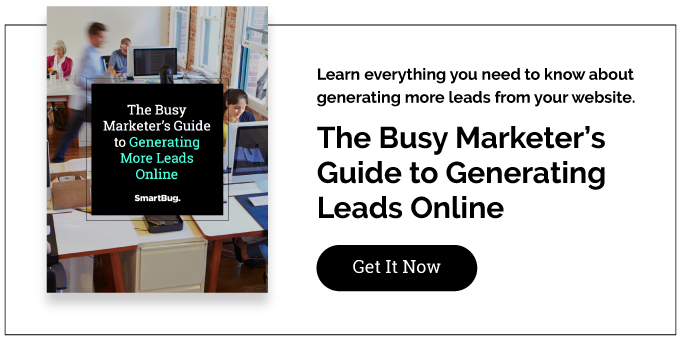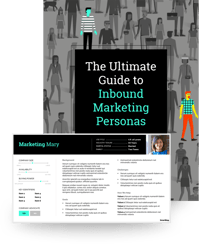
How to Generate Leads with Content Marketing and Personalization
April 3, 2023
By Emily Short
Most marketers understand this basic concept: You should create personalized content for your site visitors. But the question is where to start, especially if your product or service targets multiple buyers. Delivering the right content to the right person at the right time may seem like a daunting task at first glance. But by doing this, your leads will turn out more qualified, and you’ll have a better understanding of what someone needs.
One of the best things about inbound marketing is that you can offer content to potential buyers before they even raise their hands. How is this done? It starts with buyer personas.
How Buyer Personas Affect Personalized Marketing Content and Generate More Leads
This is where it all begins. Buyer personas are different representations of your ideal customer(s) and are essential to a robust content marketing strategy. For example, if you sell lawnmowers, you could have multiple personas, such as a lawn care company owner or a homeowner living in a suburb. These two buyers have different needs and may be looking for different solutions. By developing content that speaks to both personas, your potential customers know the solutions you offer that best fit their needs.
Speaking to your different personas is the exact thing that will make your leads more qualified. Instead of having a list of leads and not knowing what they are struggling with, challenge yourself to segment your leads into different lists, with different problems, and different needs. When you have that nailed down, it gets exciting: You can now begin developing content for your personas—based on their lifecycle stage.
Personalized Content Based on a Lead’s Lifecycle Stage
Serving customized content and creating a personalized experience, creates a more engaged user base, who are then more likely to turn into leads you can foster. Lifecycle stages matter for multiple reasons, and one major one is the ability to deliver content to the right people at the right time. In a nutshell, lifecycle stages are different points of a buyer’s journey. Whether someone is searching the web for a solution to a problem or ready to buy, we can offer different content based on their stage.
Awareness Stage Content
A buyer is in need of a solution and searching for where to find it. When creating content for these visitors, remember they are looking to educate themselves more than anything and are familiarizing themselves with possible solutions. Rather than telling them you are the best of the best, show them with relevant content.
The goal here is to provide useful information and position yourself as an expert in your field. Blogs are the bread and butter of awareness content. Additionally, you can offer types of content such as white papers and e-books to provide longer-form answers. These are often referred to as lead magnets because they are free resources for your users.
Consideration Stage Content
You’ve now built trust and a new relationship with the potential buyer. This is the stage of the buying journey when they are most likely comparing and weighing their options. This is when you can start speaking about your solution a bit and how you differ from your competitors.
Develop content that speaks to the different solutions available and why yours can uniquely help a potential buyer. When they consume this content, they instantly become more qualified. Case studies are the best example of consideration content. You could also build an offer, such as a comparison guide, that showcases the differences in solutions. This positions you as an expert on the subject.
Decision Stage Content
At this point, a buyer is more or less ready to buy from you, and you’re helping them gauge which purchasing decision they should make. The goal here is to get your lead to your sales team. This may mean they request a quote or schedule a demo.
The best way to do this is to create forms and landing pages that drive your potential customers to the next step. Placing calls to action (CTAs) strategically in the content you’ve made (as mentioned above) compels them to take the next step and move further down your funnel.
New Ways to Personalize Content and Generate More Leads
HubSpot continues to find ways to better personalize content for an audience. One powerful feature is the Smart CTA tool. The Smart CTA tool allows you to show a different CTA to a lead based on whether they have already consumed a piece of content or have expressed interest in a certain service.
For example, Offer A is an awareness white paper. There are a couple of CTAs placed throughout your site pointing to a landing page for Offer A. Your persona, Victor the Visitor, clicks on the CTA and downloads the offer. Now, when Victor goes back to the page where he originally clicked on the CTA, he doesn’t see Offer A anymore but rather Offer B, which is a consideration offer.
HubSpot also allows you to customize content for your audience based on their geolocation, device type, or time spent on page. For example, if you know that your user is near a certain city, you can feature where the showroom closest to them is located. Additionally, your business might have different services based on a user’s region or country. This ensures that they are seeing the packages most relevant to their location.
Presenting the right content to your different buyer personas will give you more qualified leads. You’ll have a better understanding of what they are looking for and will be able to move them through the funnel easily.
Are you looking for creative ways to increase your lead generation? Download our guide, The Busy Marketer’s Guide to Generating Leads Online, for best-in-class recommendations to bring your marketing to life.
.jpg?width=120&height=120&name=Emily%20Short%20headshot%20square%20(1).jpg)
About the author
Emily Short Emily was formerly a Demand Generation Strategist at SmartBug based in Tucson, Arizona. She has 5+ years of experience in marketing and sales. She is passionate about helping brands better reach their users and improving the customer experience and has been featured in local, digital, and international publications. She holds a BS from Colorado State University and is currently a Marketing MBA Candidate at the College of William and Mary. Outside of work, Emily enjoys escaping in a good book, traveling, and painting. Read more articles by Emily Short.







